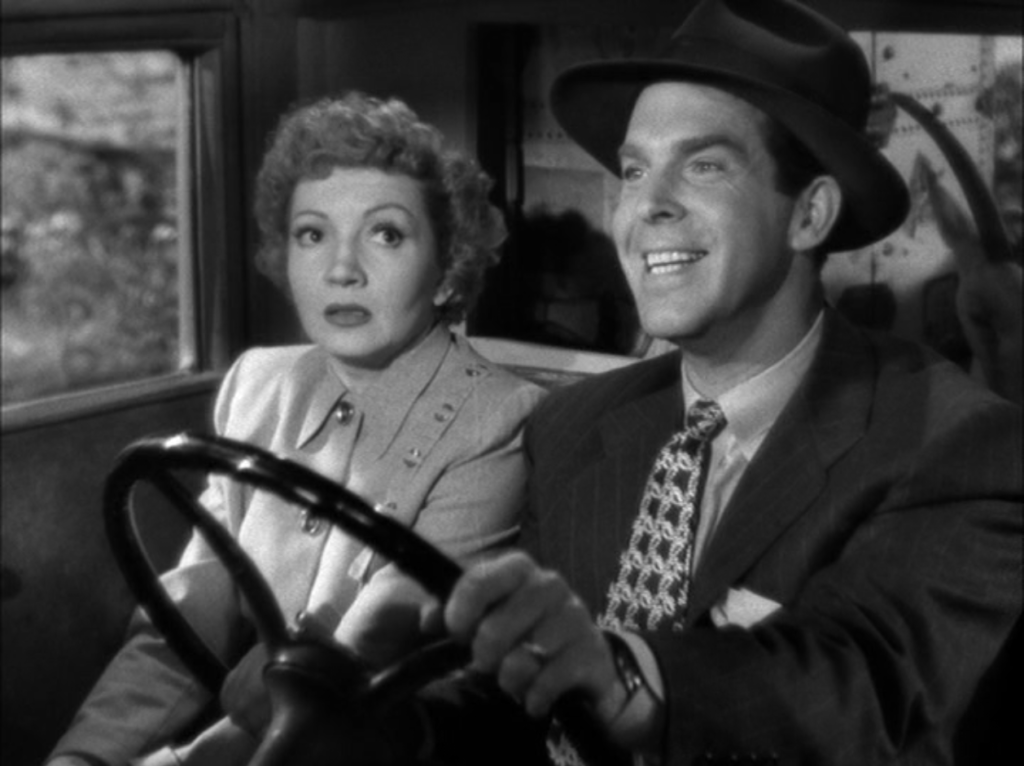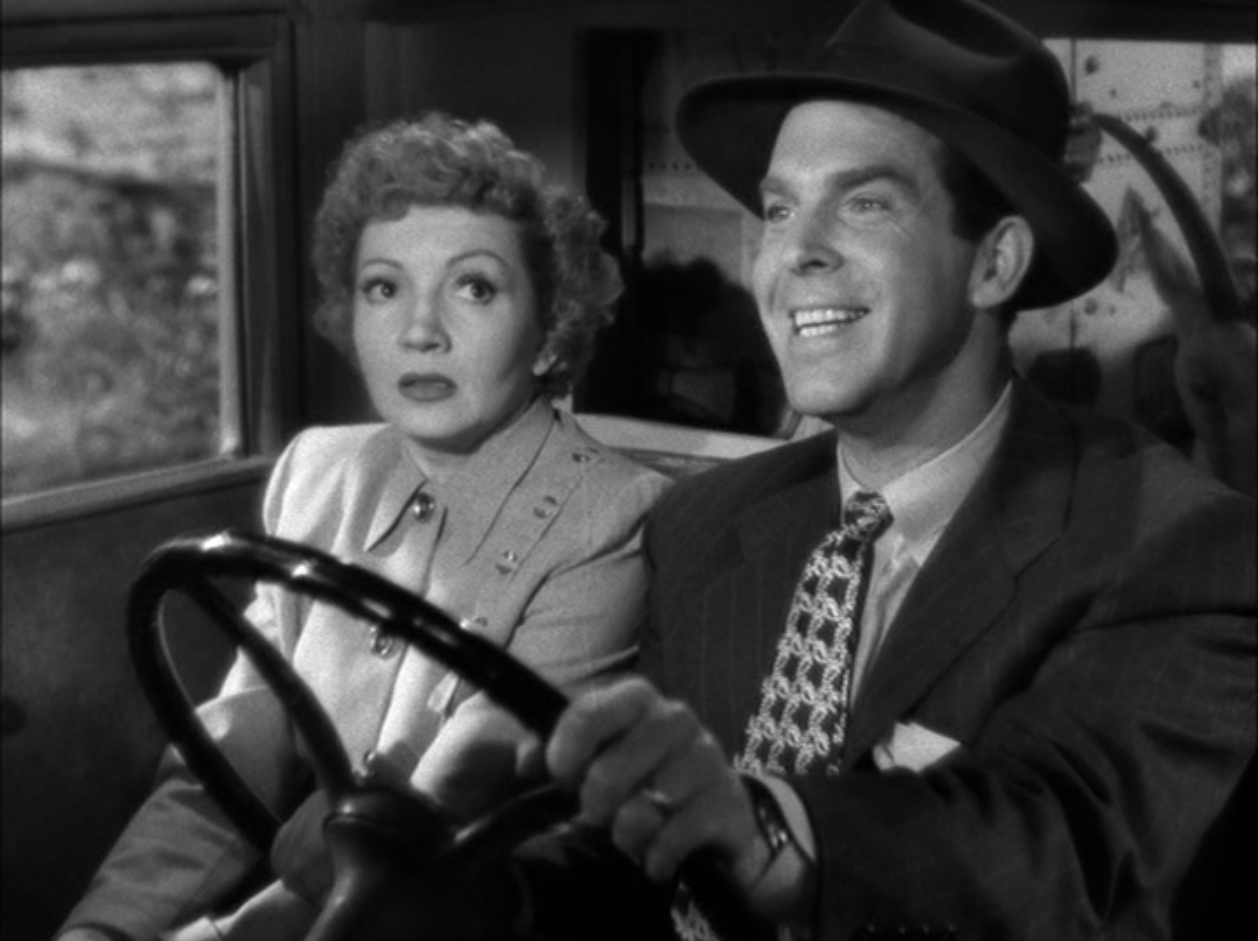Movie Review: The Egg and I (1947) directed by Chester Erskine
The newlywed Mrs. Betty MacDonald (Claudette Corbert) is shocked to learn on her wedding night that her husband Bob (Fred MacMurray) has bought a chicken farm and they’re moving there tomorrow! But she was brought up to believe that a wife supports her husband, no matter what, so she decides to make the best of it. When the newlyweds arrive in rural Washington state, Bob is thrilled by the fixing-up possibilities of their new home, while Betty is dismayed by the shambles the house, barn and other fixtures are. There’s a lot of hard work ahead!

Despite her misgivings Betty works hard at fixing up the place, carrying water, and learning to cook on a stove that was an antique even before the war. Bob makes excellent progress on his own part of the job. Soon, it’s time to meet the neighbors. Pa Kettle (Percy Kilbride) is a feckless sort who borrows things for projects he’s never going to complete, as he’s a lazy soul. Ma Kettle (Majorie Main) is feistier, but has her hands full trying to manage their ten or so children, never mind keeping the house clean. Their oldest son Tom (Richard Long) is a bit of an engineer, and could go to college if there was money, but there never will be. Despite their countrified ways, they’re good folk at heart and Betty likes the Kettles.
Not so much their other neighbor Harriet Putnam (Louise Allbritton). She’s made out well in multiple marriages (no word on what happened to her husbands) and manages a modern hobby farm. Harriet has an obvious attraction to Bob which Betty feels uncomfortable with.
Making a success of a farm is fraught with peril, from flood to fire to cougar, but miscommunication may be the ruination of everything.
This movie was based on the book of the same name by Betty MacDonald. The Egg and I was a fictionalized autobiography of the initial year with her first husband on their chicken farm. The names of the supporting characters were changed “to protect the innocent” but she still got sued.
The film updates the setting from the late 1920s to just after World War Two, and it suggests that a bit of Bob’s impulsive behavior and obsession with farming might be due to trauma he incurred during combat. Bob tends to become monomaniacal on the subject of chickens, and doesn’t consult Betty before making important decisions for both of them. He takes Betty’s “support” of his wild ideas as “happiness” with them, which eventually comes back to bite him. On the other hand, he truly is oblivious to Harriet’s motivations and never for a moment is unfaithful to his wife.
Younger viewers may be puzzled by Betty’s not making it clear much sooner that she is unhappy with Bob’s behavior and his decisions. But back in the 1920s. women really were expected to support their husbands regardless of how they actually felt, and it wasn’t totally a thing of the past in the 1940s. On the other hand, in real life Betty divorced Bob after four years and took their daughters with her. Bob was renamed “MacDonald” in the movie to obscure this. Betty does over time get more sarcastic in the movie, which Bob fails to grasp.
Both book and movie were hits, with Ma and Pa Kettle being such a delight (and they are) that they were spun off into their own 9-movie series. A chain of breakfast restaurants licensed the name, and some The Egg and I locations are still open as of this writing. Also, the basic premise was reused for the classic television sitcom Green Acres, but with a considerably more cynical take.
Some other notes: Betty MacDonald was criticized for mischaracterization of the local Native Americans in her book (shades of Stephanie Meyer!). In the movie, Betty overreacts to two of them showing up, and she’s teased for watching too many Westerns; they’re just part of the wacky neighborhood.
There’s a bit near the end where an old woman is supposed to be crazy because she talks to her husband who isn’t there–except that one shot is from the husband’s point of view! Never explained or referred to.
Content note: Pa Kettle makes his own moonshine, and people are shown drinking it. There’s a bit of social bullying–even in rural areas there’s proper folk, and then there’s “trash.” Salesman Billy Reed (Billy House) does not respect Betty’s personal space.
While this is a fine old comedy, calling it a “romantic comedy” doesn’t suit me, as the romantic part is built on some very uncomfortable foundations. As such, I recommend it primarily for the straight-up funny parts.

